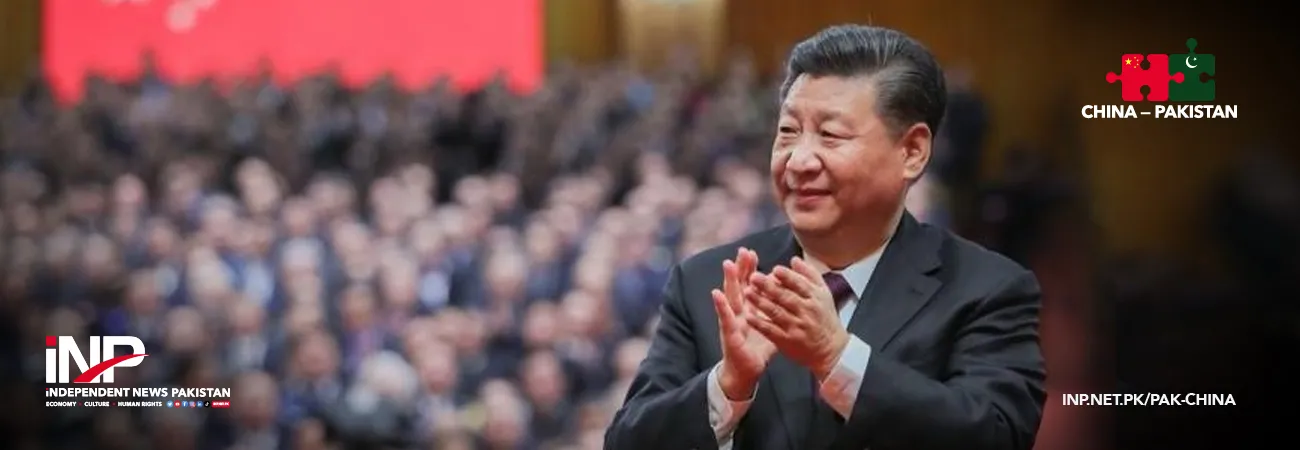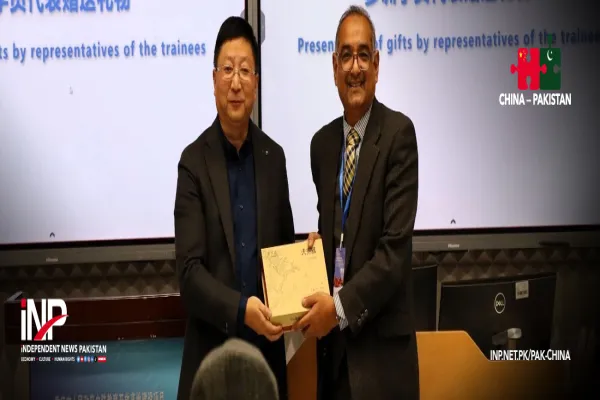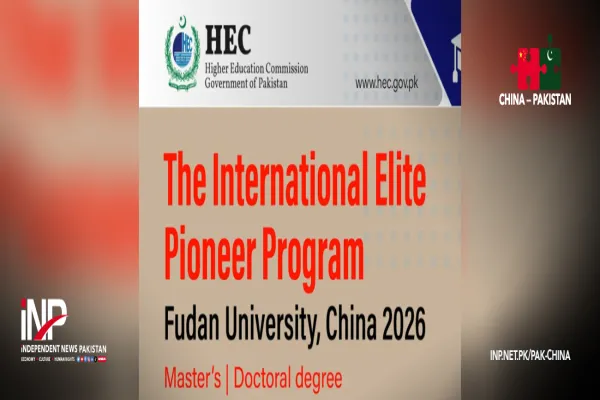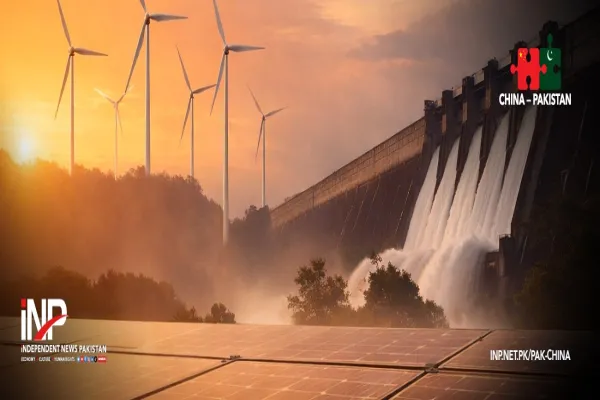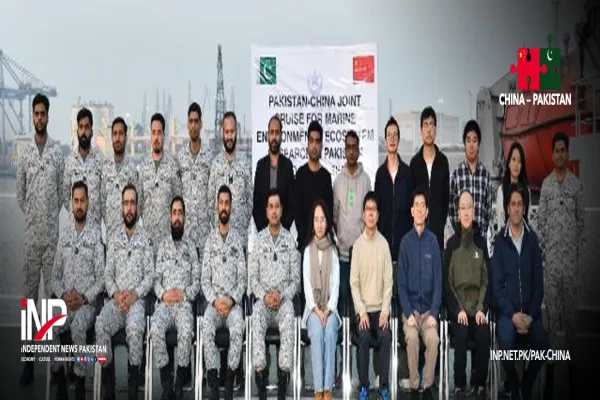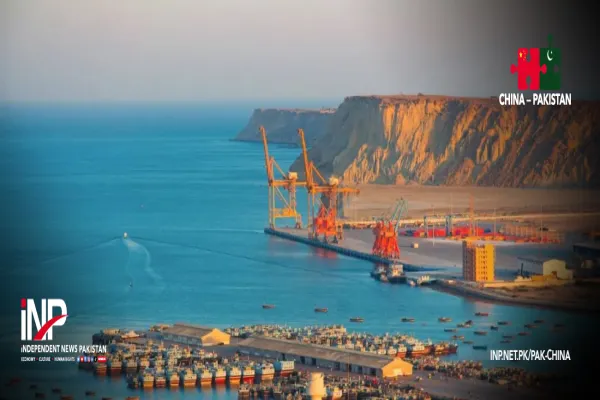i NEWS PAK-CHINA
BEIJING, March 14 (INP): Chinese leader Xi Jinping has sounded the clarion call for reform during the country's annual key political season, dispelling concerns about whether China's reform is "stagnating," or its economy is "losing steam." "We must plan major moves to deepen reform to inject strong impetus into promoting high-quality development and advancing Chinese modernization," President Xi said at the annual sessions of China's top legislature and top political advisory body, or the "two sessions," which wrapped up on Monday. Since Xi took the top office more than a decade ago, China has entered a "new era." The country's economic strength has grown, and its international influence has continued to rise. Reform is the hallmark of this era. In the face of a myriad of challenges, China is now in a critical period for accelerating reform. Xi is regarded as another outstanding reformer in the country after Deng Xiaoping. The two leaders faced the same mission -- to modernize China, but against strikingly different backdrops. When Deng launched the reform and opening-up drive in the late 1970s, China's per-capita GDP was only about 200 U.S. dollars. His push for reforms started almost from scratch.
In 2012, when Xi was elected general secretary of the Communist Party of China (CPC) Central Committee, China had become the world's second-largest economy, with a per-capita GDP of over 6,000 dollars. But growth was shifting gears and many advantages, including the once-low labor costs, had started to diminish. Instead of resting on the laurels of his predecessors, Xi was committed to carrying on the reform, and he knew how hard it would be."The easy part of the job has been done to the satisfaction of all. What is left are tough bones that are hard to chew," he said. Over the past decade, more than 2,000 reform measures have been rolled out, enabling the country to eliminate extreme poverty, promote integrated urban-rural development, fight corruption, support businesses, boost innovation, and push forward a "green revolution." With the reform measures, the Chinese economy has not only sustained robust growth but also more than doubled since 2012, cementing the country's global status as a major growth contributor.
China is currently at a critical juncture, where Xi is leading the country to realize the ambitious "Chinese modernization," while being confronted with major challenges, such as downward economic pressure following the COVID-19 pandemic, rising protectionism and suppression from Western nations, and risks associated with the real estate sector, local government debts, and some small and medium-sized financial institutions. Xi reiterated the significance of reform at a group study session of the Political Bureau of the CPC Central Committee earlier this year. Weeks later, at the "two sessions," he stressed deepening reforms in various sectors "to remove the barriers obstructing the development of new quality productive forces." The crucial role of reform was also highlighted in this year's government work report. It devoted a section to deepening reform, with a focus on improvements to systems underpinning the socialist market economy, such as property rights protection, market access, fair competition, and social credit. "Ultimately, high-quality development depends on reform," it wrote. When he was not even 16, he was sent to Liangjiahe village in Shaanxi Province to do farm labor. There, he experienced hunger.
Deng initiated reforms, believing that China could not remain poor. Xi's aspiration at that time was to ensure that his fellow villagers could have enough to eat. Like Deng, Xi's drive for reform also stems from the people's aspiration for a better life. The reform measures he implemented in Liangjiahe, including introducing biogas, establishing a blacksmith shop and opening a store selling daily necessities, aimed at improving the livelihood of villagers. Xi's commitment to reform was influenced by his father, Xi Zhongxun, a champion of reform and opening-up. In 1978, the senior Xi was sent to south China's Guangdong Province as a principal official, and later helped build the country's first special economic zones including Shenzhen. Also in 1978, Xi Zhongxun entrusted Xi, who was studying at Tsinghua University, to conduct on-site research on the household contract responsibility system in Anhui Province. He filled an entire notebook with notes, a collection he preserved for many years. Xi Jinping, then secretary of the Zhengding County Committee of the Communist Party of China (CPC), listens to opinions of villagers in Zhengding County, north China's Hebei Province, in 1983.
(Xinhua) In the early 1980s, he initiated reform experiments in the impoverished county of Zhengding, Hebei Province, commencing with the rural land contract trial, making Zhengding the first in Hebei to adopt this practice already tested in southern provinces. An article published in the "China Youth" magazine in 1985 described the county's transformation. It cited a county Party secretary from a neighboring province, who visited Zhengding, as saying: "Here, you don't hear people chanting 'reform,' but reform is happening everywhere." "Looking back at those years, one of the things we achieved was liberating our thinking," Xi said, reflecting on the reforms in Zhengding. After Zhengding, Xi was assigned to work in Xiamen, a special economic zone in Fujian Province, where Xi spearheaded the establishment of China's first joint-venture bank -- Xiamen International Bank. After he ascended to the position of governor of Fujian, Xi led reform in the collective forest tenure, which was later expanded nationwide. This initiative is known as another revolutionary step for China's rural areas after the household contract responsibility system.
During his time in Zhejiang Province, Xi proposed an innovative initiative to promote development through industrial upgrading. He actively supported private businesses, and encouraged business people to "come directly" to his office for important matters. He also extended reforms in Zhejiang beyond the economic sphere, addressing social, cultural, and ecological aspects. Xi's reformer image left a deep impression on international figures. In September 2006, Henry Paulson, then U.S. treasury secretary, visited China and chose Hangzhou, capital city of Zhejiang, as his first stop. He regarded Xi as the "perfect choice" for his initial meeting in China, describing him as "the kind of guy who knows how to get things over the goal line." Paulson later recounted that during a meeting with Xi in 2014, the Chinese leader stated, "My concern is mainly reform and related issues." After assuming the Party's top post in 2012, Xi's first domestic inspection took him to Shenzhen, following in his father's footsteps.
There, he laid a flower basket at the bronze statue of Deng Xiaoping in Lianhuashan Park, declaring a firm commitment to reform: "Reform will not stop, and opening-up will not cease!" The Third Plenary Session of the 18th CPC Central Committee, convened in 2013 under Xi's leadership, is heralded as a milestone, much like Deng's Third Plenary Session of the 11th CPC Central Committee in 1978, which ushered in the era of reform. The 2013 event marked the dawn of a new era of reform. During this session, Xi listed a series of challenges facing China's development, including corruption, unsustainable development, and environmental issues. He stressed that "the key to addressing these problems lies in deepening reform." The session approved a decision on "major issues concerning comprehensively deepening reforms." A Spanish newspaper commented that Xi had initiated the most profound economic, social, and administrative reforms in China over 30 years. More than a month later, China announced the decision to establish the Central Leading Group for Comprehensively Deepening Reform, which Xi headed.
This marked the first time in the Party's history that a leadership body exclusively dedicated to reform was established at the central level. Later, this group evolved into the Central Commission for Comprehensively Deepening Reform, with Xi as its director.The reforms led by Xi have been based on thoughtful considerations derived from his many years of practice, with a whole set of top-level designs. He has invoked the ancient Chinese idiom of "discarding the outdated in favor of the new" to call for action, believing that reform and innovation are inherent cultural genes of the Chinese nation. Xi has been clear-headed regarding the direction of reform. He has cautioned against copying the political systems of other countries, once saying that reform denying socialist orientation would only lead to a "dead end." "What cannot be changed must be resolutely kept unchanged," he stated.
Xi Jinping lays a flower basket in front of the bronze statue of Deng Xiaoping in Lianhuashan Park in Shenzhen, south China's Guangdong Province, in December 2012. (Xinhua/Lan Hongguang) For what should be changed, Xi has demanded firm actions, urging creating conditions for reform even when they do not exist yet. The must-do tasks included eliminating all drawbacks that restrict the vitality of business entities and hinder the full play of the market. With unprecedented scope, scale and intensity, Xi's reforms have covered economic, political, cultural, social, ecological and Party building fields. He has developed a methodology for reform in the new era: "properly handling the relationships between emancipating the mind and seeking truth from facts, between advancing as a whole and making breakthroughs in key areas, between top-level design and crossing the river by feeling the stones, between being bold and maintaining a steady pace, as well as balancing reform, development, and stability."
He has stressed pursuing reform in a systematic, holistic, and coordinated way and respecting the pioneering spirit of the people. Officials have also been told to "establish the new before abolishing the old" and ensure proper timing and intensity of reform to good effect. "He corrected the mentality of measuring the success of development simply by GDP growth and enabled the reform to truly touch the interests of some people," said an official from Shaanxi. He recalled that Xi had issued six instructions to crack down on illegal villa construction by officials in collusion with businesses in the nature reserves of the Qinling Mountains. It reflected the local resistance encountered by the reform in the ecological field back then. Xi has been pushing through reform in adversity and had to break the blockades of vested interests. "We need the courage to 'venture into the mountain despite knowing full well there are tigers' and continuously move the reform forward," he said.
Around the year when Xi became the general secretary, vote-buying corruption in the election of lawmakers or Party officials occurred in the provinces of Liaoning, Hunan and Sichuan. "Corrupt officials allowed bribe-paying enterprises to illegally obtain projects or manipulate the market," said a local official, citing concerns over the business environment in the rustbelt northeastern provinces then. Xi initiated an unprecedented anti-corruption "storm." The fight against corruption is beneficial for purifying the "political ecosystem" as well as the "economic ecosystem," and is conducive to straightening out the market order and restoring the market to what it should be, he said. The "zero-tolerance" anti-corruption campaign continues to roar. In 2023, it made waves across sectors, including finance, grain, healthcare, semiconductors, and even sports. Hundreds of high-ranking government officials, bank executives and hospital directors, even figures like the president of the Chinese Football Association and former head coach of the national men's football team, were investigated or indicted.
The revelations, particularly in the football sector, were shocking -- bribery could determine the outcome of matches, undermining market-based fair competition. Xi has been focused on reshaping the "competition mechanism" through reform. He advocated the necessity of reforming the Party, which has been in existence for over a century, calling for "the most thorough self-revolution." Under his leadership, a full and rigorous Party self-governance system was built, and a sound system of Party regulations has taken shape. He improved the inspection system and established the national supervision system, "confining power to an institutional cage." He also initiated an unprecedented reform of the Party and state institutions to "address major and difficult issues drawing widespread attention." This reform further dismantled vested interests. Xi has called for the resolve to "offend a few thousand instead of failing the 1.4 billion Chinese people." He propelled the Party's self-revolution to guide social change. The Party has taken the initiative to eliminate institutional deficiencies in social development to unlock productive forces, as explained by Liu Bingxiang, a professor at the Party School of the CPC Central Committee.
In this regard, Xi has advocated fully advancing law-based governance, striving to solve the long-standing problems of power outweighing the law and personal relationships trumping legal principles. He once lashed out at the phenomenon where "money can buy exemption from punishment and even buy life." On another occasion, he said: "The socialist market economy is an economy based on credit and the rule of law." He has instructed the formulation and revision of a series of laws, including the Anti-Monopoly Law, which provided the legal basis for the fair competition review system. The legal system for intellectual property rights was also improved. In a typical case in 2020, U.S. basketball legend Michael Jordan won a lawsuit in Shanghai, with a Chinese company ordered to cease using "Qiao Dan," the Chinese translation of Jordan, in its name and product trademarks. Therefore, Xi's reforms have not only led to economic transformation. He has asserted that the essence of modernization lies in the modernization of people. Fostering "cultural confidence and national pride" among the Chinese people has become a key objective of the reform. In 2012, Xi incorporated "cultural confidence" into the report to the 18th CPC National Congress.
He later integrated this concept into the "Four Confidences" of socialism with Chinese characteristics, describing cultural confidence as a "more fundamental, deeper, and more enduring force." Xi's reforms also signify a reworking of Marxism to adapt to the new era, integrating its basic tenets with China's specific realities and fine traditional culture. As a result, China's reforms have taken on fresh philosophical significance. In his 2017 New Year Message, Xi stated that "the main framework of reforms, resembling the 'four beams and eight pillars' of a house, has been essentially established in various fields." For those acquainted with traditional Chinese architecture, this signifies that the house has taken shape and can be further perfected. Xi has directed reforms toward an overarching goal: upholding and improving the system of socialism with Chinese characteristics and modernizing China's system and capacity for governance. In the year when Xi took the top office, China's annual economic growth rate dropped below 8 percent for the first time since 1999. The debt crisis in Europe severely hurt China's foreign trade and real estate regulation dragged down domestic demand.
A foreign bank analyst claimed that "China's economy is facing its most critical moment in nearly 30 years." Xi pointed out that China's economy had entered a new development stage and proposed a new development philosophy featuring innovative, coordinated, green, open and shared growth. He initiated the supply-side structural reform, pushing the economy toward high-quality development and moving to construct a new development pattern. Addressing officials on the significance of the reform to optimize the supply structure, Xi cited the story of Chinese tourists buying smart toilet seats and rice cookers abroad as an example. At that time, Chinese people were enthusiastic about purchasing a multitude of goods overseas, from luxury items to daily necessities. Meanwhile, a large number of domestic products were struggling to find buyers. After years of supply-side structural reform under Xi's watch, the quality and competitiveness of Chinese products have improved, many of which have earned international acclaim, spanning from lithium-ion batteries and photovoltaic products to drones. Media have noticed that a growing number of young Chinese consumers are redirecting their interest from imported cosmetics to domestic products.
The reform also tackled the challenge of overcapacity in certain sectors. By the end of 2022, the steel industry had eliminated outdated and excess capacity totaling around 300 million tonnes, exceeding twice the size of the entire crude steel production of India in that year. This photo taken on Oct. 10, 2023 shows the NIO Second Advanced Manufacturing Base in Hefei, east China's Anhui Province. (Xinhua) To push forward the supply-side structural reform, Xi is leading by example with foresight. A decade ago, most cars on China's roads were foreign-brand gasoline vehicles. In 2014, during an inspection of SAIC Motor, a major Chinese carmaker, he emphasized the significance of developing products that cater to diverse needs and highlighted the importance of new energy vehicles (NEVs) in strengthening China's position in the automotive sector. In the following decade, Xi became a big fan of electric cars, visiting automotive companies, touring laboratories, and showing great interest in experiencing electric cars. By the time he visited an NEV company in 2023, the country had already become a global leader in NEV technology. Every three vehicles exported by China included one electric passenger car, and China's NEV production and sales constituted two-thirds of the world's total. The new energy industry is, in fact, part of Xi's vision of new quality productive forces. The phrase "new quality productive forces" has become a fresh buzzword after Xi talked about it during his recent inspection trips, but he started to promote it much earlier.
Back in the 1970s in the village of Liangjiahe, Xi
Credit: Independent News Pakistan (INP) — Pak China



